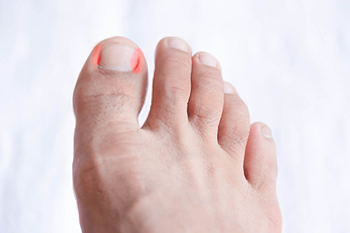
An ingrown toenail happens when the nail's edges grow into the adjacent skin, causing pain and possible infection. Typically affecting the big toe, an ingrown toenail presents with swelling, redness, and potential infection. Home treatment is possible, but severe pain or spreading requires professional attention to avoid complications. Consultation with a podiatrist is vital, especially for those individuals with conditions such as diabetes or poor circulation. Over-the-counter remedies only mask pain, they do not solve the issue. Surgery may be necessary if symptoms persist, with options including partial or total nail avulsion under local anesthesia. After surgery, proper care is essential to prevent infection, and antibiotics may be prescribed if infection occurs. If you have an ingrown toenail, it is suggested that you schedule an appointment with a podiatrist to get treatment underway immediately.
Ingrown toenails can become painful if they are not treated properly. For more information about ingrown toenails, contact one of our podiatrists of Ankle and Foot Centers of Missouri, P.C.. Our doctors can provide the care you need to keep you pain-free and on your feet.
Ingrown Toenails
Ingrown toenails occur when a toenail grows sideways into the bed of the nail, causing pain, swelling, and possibly infection.
Causes
- Bacterial infections
- Improper nail cutting such as cutting it too short or not straight across
- Trauma to the toe, such as stubbing, which causes the nail to grow back irregularly
- Ill-fitting shoes that bunch the toes too close together
- Genetic predisposition
Prevention
Because ingrown toenails are not something found outside of shoe-wearing cultures, going barefoot as often as possible will decrease the likeliness of developing ingrown toenails. Wearing proper fitting shoes and using proper cutting techniques will also help decrease your risk of developing ingrown toenails.
Treatment
Ingrown toenails are a very treatable foot condition. In minor cases, soaking the affected area in salt or antibacterial soaps will not only help with the ingrown nail itself, but also help prevent any infections from occurring. In more severe cases, surgery is an option. In either case, speaking to your podiatrist about this condition will help you get a better understanding of specific treatment options that are right for you.
If you have any questions please feel free to contact our offices located in the Greater Kansas City area . We offer the newest diagnostic and treatment technologies for all your foot and ankle needs.
